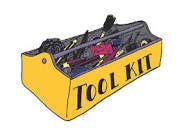Professional Development

Last month, I attempted to make an appointment with a new doctor in Connecticut for our adult son with disabilities. After reviewing a few insurance details and other logistics, I asked the question that shouldn’t need to be asked more than 30 years after the ADA was signed into law: “Can you please confirm that your office is accessible to people using wheelchairs?” Amazingly, the receptionist didn’t know the answer. And when she obtained one from a colleague, it wasn’t what I hoped to hear. “I’m sorry, but we can’t accommodate you,” she explained, without further apology. I was too exhausted to argue. But I’ve regained my strength by now, and I’m mad as hell.
According to a recent article, I’m not alone. Although doctors surveyed report they’re “doing their best,” it’s often not good enough for people with disabilities. Patients experience situations like the one above, along with a myriad of other indignities, everyday in the United States. Do you or your loved one(s) have similar stories? What did you do to affect change? Do you think we’ll ever see a time when this is not a problem?
Thankfully, some wonderful programs are underway to help reduce the challenges people with disabilities face when attempting to seek proper medical care. Today’s issue shines a spotlight on some of them. Please let me now if you know about others. By sharing what works and why, we can work to eliminate this problem in the future. Isn’t it worth a try?
To care for someone—this is kind of a philosophical comment—and to care for a patient, you obviously can know a drug, you can know a disease, you can order a test, but to actually provide care for them, you have to be able to, at some level, connect with them as a person who has value. And I'm not trying to throw anyone under the bus about it, but you have to really connect with them.
—Seth Keller, M.D., American Academy of Neurology
“Change the way you see. See the way you change.”
Faces Redefining the Art of Medical Education (FRAME) was created by an amazing non-profit called Positive Exposure. This web-based educational library and resource changes how medical information is presented to health care professionals in training, clinicians, families and communities. Unlike clinical black-and-white diagrams long featured in medical text books, FRAME creates and provides full-color teaching films featuring patients and their families discussing specific conditions and diagnoses and how these impact real patient lives. It has become a valuable staple in the educational efforts of leading medical institutions across the U.S and provides real-life perspectives to expand medical professionals’ understanding and enhance overall care.
Positive Exposure also hosts an online resource called PEARLS, which our son is involved with, that educates by giving voice to real people with differences. These are just two of the very important programs made possible by Positive Exposure, which utilizes photography and video to transform public perceptions of people living with genetic, physical and behavioral differences – from albinism to autism. To learn more, watch the TedX talk below. Click here to support Positive Exposure’s fabulous work and help celebrate the organization’s 25th year of promoting a more inclusive, compassionate world where differences are celebrated.
Who’s teaching whom?
Through our family’s work with Positive Exposure, we have also met amazing students at the world-renowned Joan H. Marks Graduate Program in Human Genetics at Sarah Lawrence College. It’s the largest graduate program in genetic counseling in the world and seeks to educate students about the theoretical as well as human-centered aspects of genetic counseling. Our son has “consulted” with graduate students to help them understand what it’s like to live with cerebral palsy. Their desire to learn from him to better serve patients and families impresses me greatly. I’m confident that work like this advances quality of care and overall understanding between patients and providers.
Co-Located Care.
The Lurie Center for Autism in Boston not only treats patients and their families. It also trains medical professionals on how to do so most compassionately and effectively. This multi-disciplinary approach enables patients and families to access care at one time and in one place, while building relationships with medical professionals and easing both short- and long-term challenges. The impact on families is tremendous.
Look what I found!
In the spirit of sharing helpful resources, I’m thrilled to share this amazing parent toolkit to help young adults with disabilities navigate life with purpose and fulfillment. (It can even be translated at the touch of a button!) Developed by the State of Delaware, it features extensive information and tips on everything from employment to housing to transition and more and is applicable to families throughout the U.S. and beyond. What have you discovered recently that you’d like to share?

Another Normal is a newsletter dedicated to helping families with disabilities bloom and thrive. Check out the archive for previous editions. And please let me know if there’s a specific topic you’d like to learn more about.
Interested in learning more about working with Kris?
Contact us for information on what this might look like for you, including outcomes, availability, fees and more.
Stay connected with news and updates!
Sign up below to receive our newsletter and updates.
We hate SPAM. We will never sell your information, for any reason.


